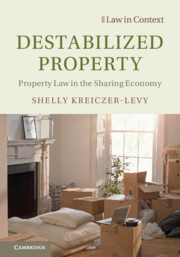Book contents
- Reviews
- Destabilized Property
- The Law in Context Series
- Destabilized Property
- Copyright page
- Dedication
- Contents
- Acknowledgments
- 1 Introduction
- 2 Stability and Property Use
- 3 The Decline of Stability in the New Millennium
- 4 The Rise of the Access Economy
- 5 Access as an Alternative to Ownership
- 6 Fragmentation of Intimate Property
- 7 Evaluating Flexibility in Property Use
- 8 What’s Next? The Future of the Access Economy
- 9 Conclusion
- Index
- Series page
8 - What’s Next? The Future of the Access Economy
Published online by Cambridge University Press: 25 October 2019
- Reviews
- Destabilized Property
- The Law in Context Series
- Destabilized Property
- Copyright page
- Dedication
- Contents
- Acknowledgments
- 1 Introduction
- 2 Stability and Property Use
- 3 The Decline of Stability in the New Millennium
- 4 The Rise of the Access Economy
- 5 Access as an Alternative to Ownership
- 6 Fragmentation of Intimate Property
- 7 Evaluating Flexibility in Property Use
- 8 What’s Next? The Future of the Access Economy
- 9 Conclusion
- Index
- Series page
Summary
This chapter considers the future of access, and flexibility in property more generally. It speculates on how new consumption technologies might affect property and the access economy. It covers big data analytics, the internet of things, and artificial intelligence. The tentative conclusion from this analysis is that new technologies promote further detachment from physical possessions, carrying on the trend marked by the access economy, but also exacerbating some of the vulnerabilities it creates. It is hard to know what the future holds, but the decline of property stability and the rise of flexible use provide a new prism for thinking about changes to the social institution of property.
- Type
- Chapter
- Information
- Destabilized PropertyProperty Law in the Sharing Economy, pp. 164 - 175Publisher: Cambridge University PressPrint publication year: 2019

